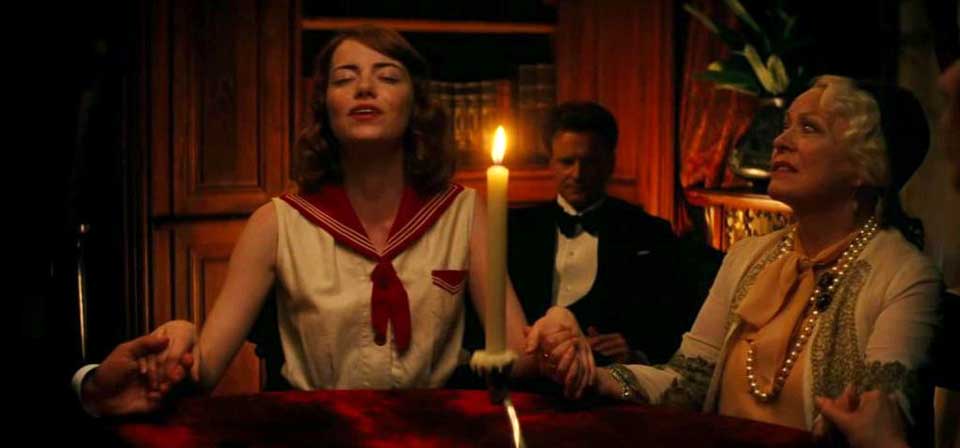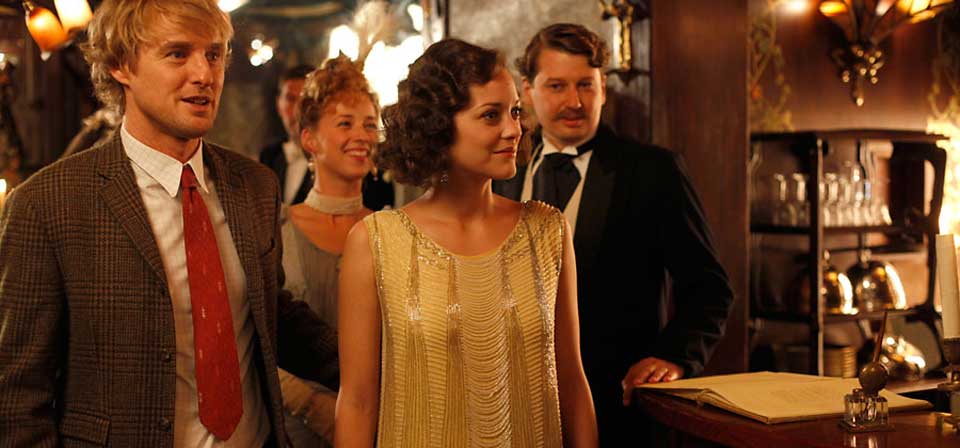Match Point (2005)
The first shot in Woody Allen’s Match Point is meant to serve as a metaphorical master-image for the film as a whole: a freeze-frame shot of a tennis ball suspended in space over the net after striking it, poised between falling on one side of the net or the other. It's an image of blind chance: Which side the ball lands on has nothing to do with which player is more skilled, let alone more deserving. The universe is indifferent to the outcome and its consequences.
Caveat Spectator
A number of nonmarital and extramarital sexual encounters (no explicit nudity); a practical proposal of abortion and discussion of a character’s history of abortion; some profanity and crass language; non-explicit murderous violence.Match Point has been hailed as a return to form for Allen, in particular harkening to the director’s landmark 1989 film Crimes and Misdemeanors, which treats similar themes of infidelity, murder and ultimate meaning.
In fact, Match Point can be read as a kind of loose remake of Crimes and Misdemeanors, or rather a distillation of its dark moral drama, purged of the earlier film’s comedic plot threads involving Alan Alda’s and Allen’s characters. In the past Allen has expressed his dissatisfaction with the comedic portions of Crimes and Misdemeanors, feeling that these detract from the film’s more serious heart. Match Point is perhaps meant to be Crimes and Misdemeanors as it should have been.
Except it isn’t. In fact, Match Point lacks precisely what is, at least arguably, the most haunting element in the earlier film: its sense of genuinely conflicted existential drama.
Crimes and Misdemeanors is an obsessive meditation on the razor’s edge between guilt and unbelief, a film torn between radically different existential alternatives. Like the tennis ball in the opening shot of Match Point, the moral drama in Crimes and Misdemeanors is suspended between two outcomes, and absolutely everything hangs in the balance.
In Match Point, ironically, that sense of existential suspense and conflict has been replaced by complacent moral nihilism all but untroubled by ultimate concerns. Moral awareness is little more than a distant memory, dredged up in a single, late sequence for the sole purpose of being scuttled permanently. From the first scene onward, far from hovering between live, felt alternatives, the film’s center of gravity lies solidly on one side of the court, like a forgotten tennis ball from some game long over and done.
Perhaps in part by way of escaping the overtones of Judeo-Catholic guilt and psychoanalytic introspection suffusing the New York atmosphere of any number of Allen films, Match Point tells a story originally developed in the Hamptons but relocated to London for the director’s first UK shoot.
Chris Wilton (Jonathan Rhys-Meyers) is a soulless young tennis pro working as a coach at a posh London club, where he effortlessly tailors his stroke and his banter to the level and style of whomever is in the opposite court. Chatting with club member Tom Hewett (Matthew Goode), scion of an affluent high-society family, Chris happens to remark that he, too, loves the opera. To Tom’s pretty sister Chloe (Emily Mortimer) Chris confesses that while he’s fascinated by London’s cultural opportunities, he hasn’t yet taken advantage of them. Before long the Hewitts are showing Chris around, and he finds ways of ingratiating himself to their parents as well.
Then Chris meets someone who unexpectedly brings out the full unmoderated force of his powerful serve and desires: Nola Rice (Scarlett Johannson), a competitive American beauty whom Chris meets over a Ping-Pong table. After taking the most direct route to ending their very short first volley, Chris proceeds with equal directness to put some other moves on Nola.
“Did anyone ever tell you you play a very aggressive game?” she challenges him.
His put-away return: “Did anyone ever tell you you have very sensual lips?”
Chris is only mildly deterred by the discovery that Nola is in fact Tom’s fiancée. After all, Chris and Nola have so much in common: She’s an aspiring actress and an outsider in the high-society world of the Hewitts, poised on marrying into the comfort and security of that world.
As things turn out, though, Nola is the more down-to-earth of the two. She’s the one who initially recognizes the unviability of an affair between herself and Chris. When Chris continues to pursue her and the sparks between them eventually burst into flame, she tries to bracket the experience and move on, while Chris continually presses for more. He sees no reason why he can’t have what he wants from Chloe (a comfortable existence with a favored position at her father’s firm) and also what he wants from Nola (hot sex).
Nola, though, isn’t reconciled like Chris to a life of infidelity and deceit. She isn’t the type to be content with indefinite “other woman” status, to settle for sharing a man with his wife. Chris, of course, will play both ends against the middle for as long as he possibly can, in the end doing whatever he finds necessary to protect his core interests.
The ball is in play. All that’s lacking, at least until a crucial penultimate sequence, is any particular sense that something larger than the satisfaction of Chris’s various itches hangs in the balance.
In Crimes and Misdemeanors, when Martin Landau’s Judah Rosenthal wrestled with situations similar to Chris’s, he did precisely that: wrestle. Judah had been brought up to believe that God sees everything we do, and that belief meant something to him, even when he decided he didn’t really believe it after all. The question of belief or unbelief, of guilt or nihilism, was never of less than vital importance to him; the nonexistence of God was no less important than his existence. Judah had believed he was a good man; he was both appalled and relieved to learn that he wasn’t.
In Match Point, by contrast, apart from that late sequence, Chris takes his self-serving approach to life for granted, without a flicker of conscience or moral awareness. He never looks deep within himself, and neither does Allen. He’s a cipher, a pretty poster boy for Richard Dawkins’ The Selfish Gene.
Chris has been compared to the unspeakable, seductive title antihero of Patricia Highsmith’s The Talented Mr. Ripley, though he’s both less charismatic and more human than Ripley — or at least more fallible, capable of getting nervous and making sloppy mistakes.
In particular, one crucial mistake is overtly framed like the murderer’s key blunder in an episode of “Columbo.” Will it come back to haunt him?
And so we come at last to that crucial late sequence, in which Chris’s actions do in a sense come back to haunt him, and he belatedly ponders the deeper significance of his actions and the possible consequences. Like Judah in Crimes and Misdemeanors, Chris calmly acknowledges his own capacity for what others consider evil. But he also confesses a sense in which he might actually want to be caught, which might make it easier to believe in a larger justice in the world (not that he has previously shown the slightest interest in this subject).
And then Allen lets the other shoe drop. Having suggested (though not established) a link between the consequences of Chris’s key mistake and the existence or nonexistence of real justice, Allen doesn’t just let events play out one way or the other — he pulls a reversal of expectations that is nearly Chestertonian in its paradoxical force. The very thing that could have pointed to God is turned back on itself; Allen doesn’t just leave God out in the cold, but blows him a Bronx cheer.
Until this point, though, Match Point doesn’t so much reject transcendent reality as ignore it to the point of oblivion. Where Crimes and Misdemeanors found the notion of God’s nonexistence dreadful and gratifying, Match Point largely disregards the whole question, glibly adding at the end, “Yep… didn’t think so.”
Does the difference between the two films reflect Allen’s own journey over the last fifteen-odd years? Has some fire in his belly over transcendent questions gone out (or mostly out)? Is there a sense in which Chris Wilton (character age notwithstanding) can be seen as Judah Rosenthal fifteen years later, the struggle over guilt and unbelief now hardly a distant memory? Less indirectly, has Allen gone in the last fifteen years from being Judah to being Chris?
Is the shift in emphasis from being willing to live with having done it (Crimes and Misdemeanors) to getting away with it (Match Point) related to the vagaries Allen’s life over the last fifteen years? Is Allen ultimately smirking over the universe’s ongoing failure to punish him for his sins?
Allen wouldn’t be the first God-haunted artist to struggle at the height of his career with questions of faith and despair that in his later work cease to resonate. Ingmar Bergman, one of Allen’s idols, wrestled profoundly with the absence of God in the films of his middle period, but eventually seems to have made his peace with the emptiness of the universe. Similarly, Graham Greene’s middle novels are torn by the conflicting forces of spiritual belief and personal immorality, but in his later novels the struggle seems to have drained out of Greene’s soul, his focus shifting from morality to politics.
Complacency, suffice to say, doesn’t make for great or compelling art. Crimes and Misdemeanors is a messy, deeply felt masterpiece. Match Point is a neat diagram, with clean lines, photogenic leads, good acting, realistic complications, a terrific twist, and no soul.
Related

Raking through the ashes of unbelief: Woody Allen’s lost spark
Woody Allen keeps telling us God is dead, but he also keeps compulsively burying him.
Magic in the Moonlight [video] (2014)
Watching Woody Allen’s latest, starring Colin Firth and Emma Stone, is like watching your uncle doing a card trick you’ve seen him do a hundred times.

Midnight in Paris (2011)
It’s a nostalgic film about nostalgia — nostalgia for when Paris was Paris, for one thing. Even if you’ve never been to the City of Light, even if phrases like “the Lost Generation” and “la Belle Époque” hold for you none of the magic they do for Allen, the film makes you feel their power for his onscreen alter ego, appealingly played by Owen Wilson.
Recent
- Benoit Blanc goes to church: Mysteries and faith in Wake Up Dead Man
- Are there too many Jesus movies?
- Antidote to the digital revolution: Carlo Acutis: Roadmap to Reality
- “Not I, But God”: Interview with Carlo Acutis: Roadmap to Reality director Tim Moriarty
- Gunn’s Superman is silly and sincere, and that’s good. It could be smarter.
Home Video
Copyright © 2000– Steven D. Greydanus. All rights reserved.